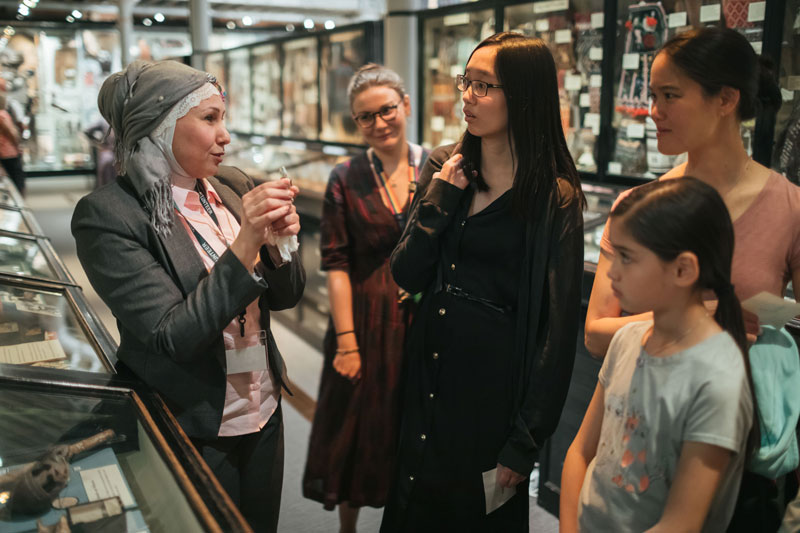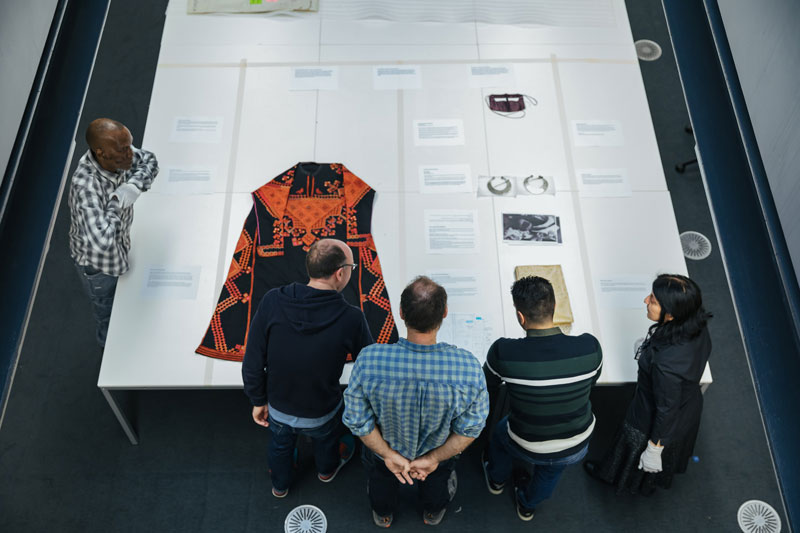Fostering intercultural understanding through museum collections
Inspired by a project launched four years ago in Berlin, Multaka-Oxford uses museums and collections as a meeting point for bringing people together.
Before coming to Oxford in 2018, Hussein Ahmed worked in an embroidery factory in Turkey. Three years before that, he was living in Syria. ‘I finished high school and was preparing to study law at university, but I didn’t because war started and I was forced to leave my country,’ he explains.
Hussein is one of a number of people each year who settle in Oxford after fleeing persecution and danger in their own countries. Shortly after arriving in the city, a contact at a local community organisation suggested he might like to get involved in Multaka-Oxford, a project providing volunteering opportunities for forced migrants in museums.
The initiative, whose name means ‘meeting point’ in Arabic, is being delivered jointly by the History of Science Museum and the Pitt Rivers Museum. It sees participants train as tour guides and community curators, conduct collections research, and share their knowledge with the public through multi-lingual events, tours, blogs and displays.
 A project volunteer leads a tour at the Pitt Rivers Museum. Photo by Ian Wallman
A project volunteer leads a tour at the Pitt Rivers Museum. Photo by Ian Wallman
‘I thought it would be a good opportunity to learn more about history and culture,’ says Hussein, who has now been volunteering on the project for over a year. During that time, he has given six tours based on objects from the History of Science Museum’s Islamic scientific instrument collection. He also helped to co-curate a temporary display of textiles from the Arabic world at the Pitt Rivers Museum
According to Rachel Harrison, Multaka’s Volunteer and Community Engagement Coordinator, both collections resonate deeply with those involved in the project. ‘Not only is there an emotional connection, but the volunteers also see the prestige with which these cultures are treated in the museums,’ she explains. ‘The objects are safe; they’re being studied and researched and displayed.’
As well as helping participants to reconnect with a culture they’ve left behind, the project also offers them an opportunity to learn new skills, gain work experience and practise their English. When Hussein first joined the Multaka team, he needed a translator with him at all times; he is now able to meet with project staff on his own. ‘I’ve also learnt how to talk to people without feeling shy,’ he adds.
After eight months of volunteering, Hussein felt confident enough to apply for a job. He is now employed full time as a Visitor Services Assistant at the Ashmolean Museum. ‘The project does focus a lot on transferable skills,’ says Rachel, who has also written references for participants hoping to work in the education sector and in the NHS. ‘There’s a real sense of people’s confidence to access new places having been boosted.’
 Multaka-Oxford volunteers planning the Connecting Threads display at the Pitt Rivers Museum. Photo by Ian Wallman
Multaka-Oxford volunteers planning the Connecting Threads display at the Pitt Rivers Museum. Photo by Ian Wallman
It’s not just the volunteers who have benefited from the project, however. By giving space to diverse voices – and listening to them – the museums have gained important insights into the interpretation and presentation of their own collections. ‘We’ve noticed on so many different levels the benefit that the volunteers have brought,’ Rachel continues, ‘both from the research that they are doing, which is stored forever in the museums’ databases, to the way that they can communicate with people. We’ve seen a real change in who comes into both museums as a result.’
As well as helping to make the collections more accessible, the project has also fostered a sense of intercultural understanding between those visiting the museums, and those volunteering in them. ‘I can see that the project is doing a lot for bringing people together and encouraging people to understand new perspectives and different ways of living,’ says Rachel. Hussein agrees: ‘People here respect my language, respect where I come from. They like to hear about different cultures and that’s been very encouraging. It has really helped me to feel part of this community.’
Multaka-Oxford has been supported by the Esmée Fairbairn Collections Fund, and delivered in partnership with local community organisations including Asylum Welcome, Connection Support and Refugee Resource.
SUPPORT OXFORD’S MUSEUMS